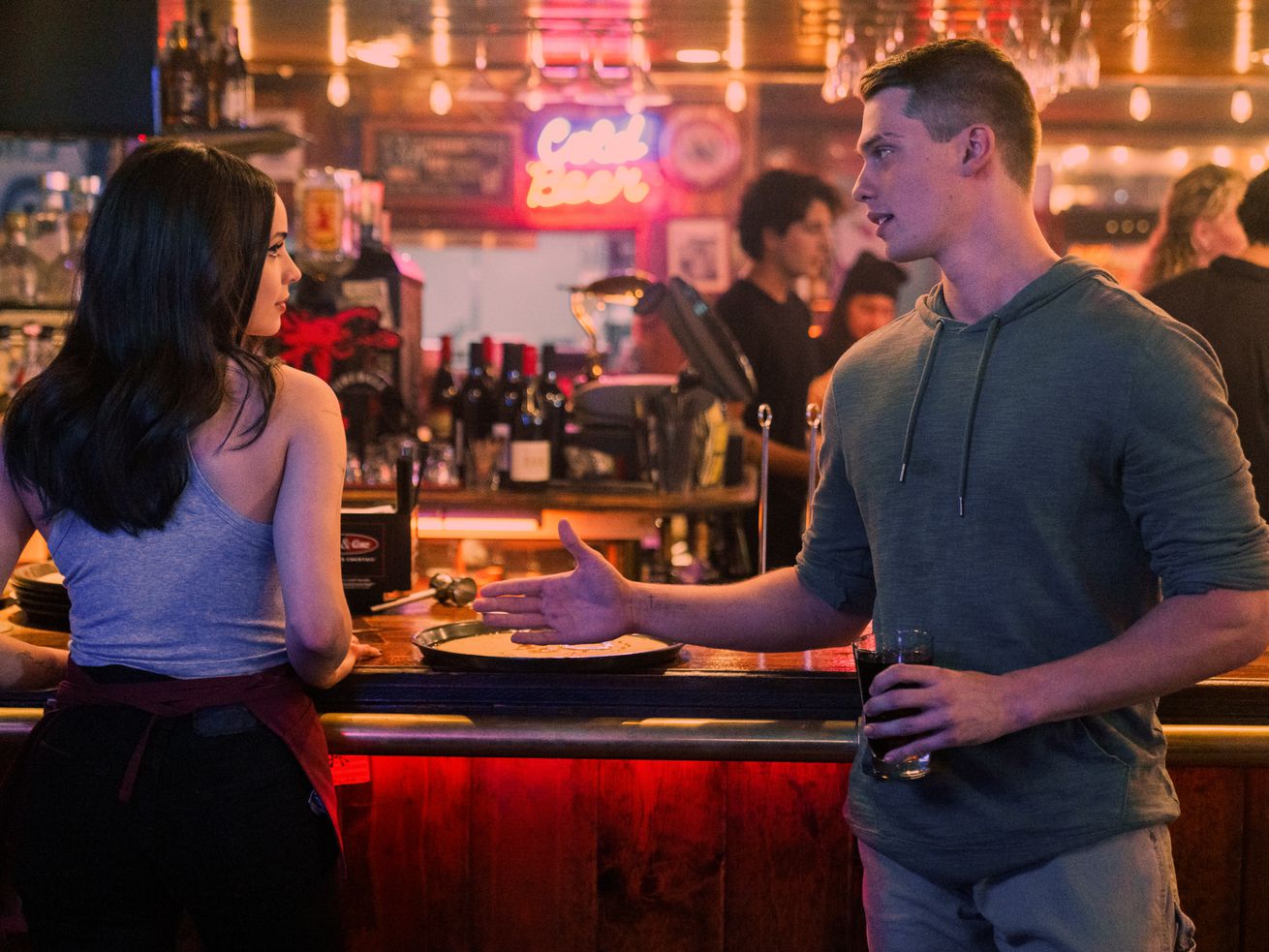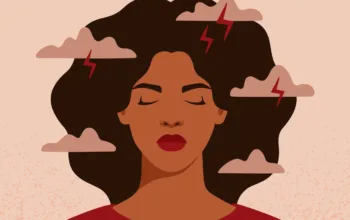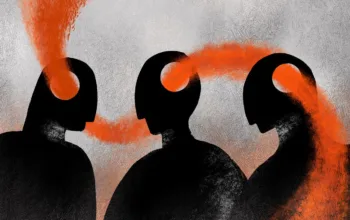Purple Hearts tries to romanticize the ideological middle. It actually glorifies something much uglier.
On the surface, Netflix’s wildly popular Purple Hearts is a typical romantic drama. An enemies-to-lovers marriage of convenience story set amid soft lighting, choice LA filming locations, and a soundtrack full of original songs, Purple Hearts has enough aesthetic appeal to feel like an interesting update on the Nicholas Sparks formula. The film, which debuted July 29, has been the most-watched movie of the month, racking up over 100 million hours in one week alone, and over 150 million hours since its release.
Romances, however, aren’t usually high on everyone’s hate-watch list — and Purple Hearts seems to infuriate as many viewers as it enchants. The story revolves around a troubled Marine and a strong-willed singer who wind up faking a marriage for money despite their ideologically opposed viewpoints. That’s the key to the film’s title: His “red” viewpoint and her “blue” viewpoint melding together make … purple hearts.
Despite the titular color scheme, however, there’s no mutual shift toward the middle here. In this story, for these lovebirds to unite, one of those worldviews has to tilt toward the other.
And, spoiler alert, it’s not the worldview of the character whose opening scene includes a shot of a drill instructor intoning, “You are what right looks like.”
In the three weeks since its release, Purple Hearts has been widely condemned as a piece of propaganda, for the military and even for the “MAGA” movement. (In fact, the US military was involved with production.) It includes, among other things, an embrace of explicit racism and a portrayal of its feminist character as a control freak.
To be clear, the film, which stars actress/singer Sofia Carson as Cassie the starving artist and Nicholas Galitzine as Luke the desperate Marine, has legions of fans. Working with frequent Lady Gaga collaborator Justin Tranter, Carson co-wrote and sings most of the movie’s original music while in character as Cassie; the soundtrack has so far spent two weeks in the Billboard Top 10. The script has won plenty of praise for its swoon-worthy moments.
Just finished Purple Hearts and everyone stop whatever you’re doing and watch it. it’s so good i loved it. pic.twitter.com/nAEFk4ymry
— sa (@urxsal) July 31, 2022
This Movie hit close to home. Boyfriend is a Marine who is conservative and I am an undecided, we butted heads about thing heck yes. A lot of things that Cassie and Luke hit on. But this movie was so beautifully made and my boyfriend and I loved it!! @SofiaCarson @nickgalitzine pic.twitter.com/0JevsNZ8jU
— Sofia_Carson-Purple Hearts (@SofiaCarson_HQ) August 13, 2022
But according to its detractors, the swooning of its fans is a big part of the problem.
when the military propaganda in purple hearts does exactly what it was supposed to do but people are too stupid and horny to see it pic.twitter.com/4YkHMa6oc8
— flora ❤️ (@tinybookclub_) August 1, 2022
Purple Hearts’ premise isn’t the typical rom-dram fare
Purple Hearts does try to grapple with serious themes, particularly poverty and a broken health care system. After meeting at the bar where she works, Cassie and Luke clash at first sight, but they have one thing in common: money issues. She has diabetes, and insulin costs are skyrocketing — a plot beat that feels particularly relevant this month. Meanwhile Luke, a former addict who’s now sober, owes several thousand dollars to a drug dealer. So they hatch up a scheme to defraud the military for marriage benefits; they just have to fake being in love.
Their conflicts are a bit deeper than those of the typical rom-dram couple. In their first scene together, after they clash over Cassie’s dislike of the military, Luke dresses her down by sketching out a portrait of what he deems to be her hypocritical politics. Cassie is written as a flat stereotype of what conservatives must imagine progressives are like. Obnoxious condescension is her default mode; she sneers things like, “I have an ethical code that doesn’t include blind obedience” when she’s mid-conflict. Meanwhile, Luke calls Cassie a “liberal nut” and a “snowflake” without much apparent sense of humor, and he’s so hyper-masculine that he’s threatened by the prospect of doing a pinky swear in public.
The entire script is a bingo card full of politicized stereotypes, but it’s clearly chosen which “side” of the ideological spectrum the audience is supposed to find more relatable. When Cassie meets Luke’s fellow marines before they all deploy to Iraq, one of them busts out some garden-variety Islamophobia, whooping that he can’t wait to go “hunting down some goddamn Arabs!” When she recoils and visibly reacts, he picks a fight with her and snarls something insulting about pronouns as a way of mocking her liberal sensitivity, because it’s apparently fine for the script to use trans people existing as a stand-in for “pushy liberals.” (It’s not fine.) When Cassie, understandably pissed, asks the marine not to make blanket generalizations about human beings, Luke orders (!) Cassie to sit down, then erupts, bangs his fist on the table, and storms out. Then he criticizes her for not being more understanding (of the racist) and for ruining everyone’s night (by being mad about racism).
Cheers to the happy couple!
Naturally, it only takes a few montages and a deployment for them to move past these differences. While Luke kicks soccer balls to playing Iraqi children, Cassie composes songs inspired by her new life as Luke’s fake wife, which naturally go viral and propel her to burgeoning fame. As their relationship deepens, Cassie learns to like all the marines, even the racist one(s), and starts hanging the American flag next to her BLM and pride flags.
The script insists that Cassie’s feminism stems from her underlying control issues. The implication is that once she loosens up, her liberalism will, too. This “Cassie is too controlling” narrative stands, despite the fact that Luke completely freaks out and throws a tantrum every time she makes any kind of decision without him. He also lies by omission about the most damning part of his past (it involves some light car theft). Naturally, his lies and control issues mask some sort of vulnerability — but we don’t really see much of it. Nor do we see Luke falling in love with Cassie, outside of evincing a sense of responsibility for her welfare.
When he’s not calling her a snowflake, judging her mother for immigrating illegally, yelling at her after she lets him move into her apartment on no notice, or getting angry because she got him a dog, whatever Luke does for Cassie offscreen must be extremely charming because it’s enough to get her to commit herself repeatedly to the sham marriage. Eventually, she decides, it’s the realest thing she knows. “My thoughts aren’t mine, now they’re yours,” the newly chastened Cassie sings at one point, her inner shrew now duly tamed. If you’re wondering if he ever apologizes to her for any of his own behavior, or if he ever, for example, asks his friend to be less racist? That would be a no. The only deep change happening here is on Cassie’s side.
What’s perhaps most frustrating about this framework is that it presents people whose values even slightly lean to the left as fundamentally incapable of lending support to Americans serving in the military without some kind of change of heart. The movie also seems to want “support for the military” to stand in for a broad range of conservative beliefs and behavior the movie assumes liberals and progressives just don’t partake in, including a strong love of country, religion, and basic empathy. In one scene, Cassie appears surprised to discover that servicemen have … families that love them. In another, she discovers that she enjoys saying “God bless you” to random people on the street. “I hate the way I say words that I laughed at before,” she sings at one point, apparently processing all this.
But why would Cassie have mocked these ideas before? None of these things are incompatible with feminism or anti-racism or inclusive language. Of course they aren’t. Still, the movie’s truest propaganda, alongside its romanticizing of military life, America’s role in Iraq, and war, is suggesting that they are.
So how did this movie even happen?
Purple Hearts bubbled up from the capitalist id of the entertainment industry — specifically, the book packaging company Alloy Entertainment, which produces books meant to become media properties. They’re the company that brought the world Gossip Girl and Netflix’s You, among many other book franchises turned TV hits. According to the film’s director, Elizabeth Allen Rosenbaum, the Purple Hearts project began its life around 2012, after an Alloy executive heard a podcast about couples getting married for the benefits and expressed interest in the plot. It kicked off as a 2015 Alloy development deal based on an idea by writer Kyle Jarrow. The book Purple Hearts, based on Jarrow’s story and written under the name Tess Wakefield, wasn’t published until 2017. The 2022 screenwriters of Purple Hearts are Jarrow and Liz Garcia, a writer-producer with a broad range of TV credits, including showrunning the slick, clever thriller The Sinner.
So the story is mainly Jarrow’s. Jarrow is an Obie winner whose credits include writing the book for the Spongebob musical, which is a cautionary tale about climate change, and two episodes of the firmly progressive Star Trek: Discovery. Hardly the bio of a red-state propagandist. Yet Jarrow also created the CW show Valor, a military melodrama about an elite team of special forces; it received poor reviews and was canceled after one season, but shows Jarrow’s ongoing interest in the armed forces.
Rosenbaum’s approach to the material also gives us pause. Defending the film to Variety in response to the backlash, Rosenbaum, a veteran television writer, framed the movie she made as a rosy love story of extremists learning the joys of moderation.
“They are flawed at the beginning and that was intentional,” she said. “In order for the red heart and the blue heart to kind of turn purple, you have to have them be kind of extreme. … So they’re both neglected by the system, and then they live under one roof, and in these extreme circumstances, they learn to become more moderate and to listen to each other and to love.”
This is an odd statement for several reasons, especially because neither of these characters is actually extreme. Except for his casual dismissal of racism, the Luke we see onscreen is just your average white dude. Except for that glaring and suggestive flaw, and outside of his support of the military, we barely even hear what his beliefs are, since disliking liberalism for unspecified reasons doesn’t count. Cassie likewise is your typical Californian. We’re told she’s a strong feminist, and we’re clearly supposed to think she’s the embodiment of too-“woke” Gen Z-ers. But while she’s an independent character, we never hear her voice explicitly feminist beliefs, and certainly not “extreme” ones. Her gestures toward liberalism — flying a Black Lives Matter flag next to a Pride flag on her balcony, or voicing her experience with anti-immigration laws — aren’t extreme either.
Rosenbaum seems to want Purple Hearts to be a lesson to liberals anyway. “Our intentions are very pure,” she told Variety of her fellow filmmakers, “and it’s because we feel like people need to grow and need to start to become more moderate.” Is “moderate” what we’re calling staying silent and smiling in the face of explicitly racist statements about killing Arabs? It’s all the worse when you consider that, historically, moderates’ acceptance of such hyperbolic racism has allowed white supremacy to flourish.
Even if the film’s agenda might have initially trended toward a meeting in the middle, the production’s decision to work directly with the US military gave it a much different result. Rosenbaum, in an interview with Military.com, praised the production’s working relationship with the military and the Camp Pendleton marine base in Oceanside, which allowed the crew to film on location.
Yet she also admitted that to get that level of access, the military demanded and received a script rewrite. “We did have to adjust a little bit of dialogue to show a more balanced depiction of the Marine Corps,” she stated, “because we had a couple of Marines [who are still in the movie] that weren’t particularly educated and were making slurs. So we balanced it out with a couple of the other characters.” Again, it’s not entirely clear where that balance went; the film doesn’t show anyone except Cassie condemning said slurs, and she’s roundly eviscerated for it. Rosenbaum also suggests the military might have seen the script before signing off on giving the crew access, which implies it was likely always a highly positive portrayal.
That said, pro-military movies are Hollywood’s bread and butter, and if all Purple Hearts delivered was a stirring love story in wartime, the odds are good it would have been fairly anodyne. But story elements that might have been merely cloying become offensive when they’re paired with this much inherent underlying racism and misogyny. Purple Hearts asks a woman of color to conform to the vague moral standards set for her by a white man she barely knows, and to learn to love and prefer her own submission. Then it presents Cassie’s appalling narrative to the audience as though it’s a valuable lesson about empathy and unity instead of an alarmingly regressive cautionary tale.
No wonder Purple Hearts is wounding as many hearts as it touches.
Author: Aja Romano
Read More



